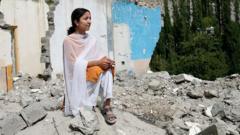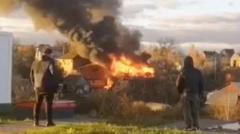
Climate Change Threatens Mountain Communities in Pakistan’s Gilgit-Baltistan Region
In the Hunza valley of Pakistan’s Gilgit-Baltistan region, the devastating impacts of climate change are dramatically reshaping local communities. Komal Sher, an 18-year-old resident of Hassanabad village, witnessed firsthand how quickly life can change when a glacial lake suddenly burst, sending a torrent of water, boulders, and debris cascading down the valley.
What was once a lush, green landscape has been transformed into a barren, rubble-strewn area. Komal’s family home, like many others, was swept away as the ground beneath them literally disappeared. The incident is part of a broader pattern of environmental changes affecting the region, often referred to as the “Third Pole” due to its extensive ice coverage.
Researchers warn that if current emissions continue, Himalayan glaciers could lose up to two-thirds of their volume by the end of the century. The Aga Khan Development Network reports that over 48,000 people in the region are at high risk from potential lake outbursts or landslides, with some villages like Badswat already being evacuated.
Deedar Karim from the Aga Khan Agency for Habitat explains that climate change has increased the intensity and frequency of disasters in the area. Changes in rainfall patterns, snowfall, and glacier melting are dramatically altering the region’s environmental dynamics, causing widespread damage to infrastructure, agricultural lands, and communities.
Local authorities face significant challenges in managing these risks. Zubair Ahmed from the Disaster Management Authority acknowledges the limited resources available to address the growing threats. The region has implemented some mitigation measures, including early warning systems, stone and wire barriers to slow floodwaters, and community evacuation drills.
In the village of Passu, residents regularly practice emergency evacuation procedures, understanding that outside help may take days to arrive if roads and bridges are destroyed. Volunteer Ijaz notes the increasing unpredictability of local weather, observing that conditions can change dramatically within minutes.
The human cost is profound. Elderly residents like Sultan Ali feel helpless, knowing their homes and generations of family history could be wiped away at any moment. Komal and her community face an uncertain future, with limited options for relocation.
Pakistan, despite being responsible for less than 1% of global greenhouse gas emissions, is one of the countries most vulnerable to climate change. Local officials emphasize that while they cannot stop these environmental changes, they can only work to mitigate risks and prepare communities.
The story of Hassanabad is a stark reminder of the immediate and devastating impacts of climate change on vulnerable mountain communities. As glaciers melt and weather patterns become increasingly unpredictable, entire ways of life are being fundamentally transformed.









